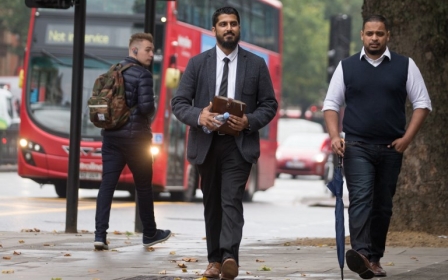Cage director to take 'Schedule 7' appeal to UK's Supreme Court

Professionals who refuse to disclose confidential information about clients or patients during airport checks risk being convicted under the Terrorism Act, a rights campaigner said on Tuesday following a High Court ruling upholding his conviction under "Schedule 7" powers.
Muhammad Rabbani, director of Cage, made his comments after his conviction for obstructing a "Schedule 7" stop at Heathrow Airport was upheld by the High Court.
In November 2016, border police officers stopped Rabbani for questioning and he refused to reveal passwords and PIN codes for his electronic devices, leading to a conviction last September.
Rabbani subsequently said he had refused to give examining officers access to his devices because they contained sensitive information relating to the legal case of a man who alleged that he had been tortured while in US custody.
In a statement, Rabbani said he now planned to take his appeal to the UK’s highest court, the Supreme Court. He said the High Court’s judgment had set a “dangerous precedent”, which meant others entrusted with confidential information also risked being prosecuted under the Terrorism Act.
“It now means that privileged material carried by lawyers, human rights advocates, NGO workers and others is not safe, and trying to protect such information can now result in a ‘terrorism’ conviction. We will be appealing this at the Supreme Court,” Rabbani said.
Schedule 7 of the Terrorism Act allows police and border officers to question and search travellers as they pass through airports and ports to ascertain whether they are involved in terrorism.
Police officers told Westminster Magistrates' Court in September that Rabbani had been stopped based on specific information and that they knew he worked for Cage, an advocacy organisation which campaigns to highlight civil liberties issues raised by counter-terrorism policies.
Schedule 7 powers allow officers to search electronic devices and ask for access codes, but the Code of Practice says officers must “cease reviewing, and not copy, information for which they have reasonable grounds for believing is subject to legal privilege, is excluded material or special procedure material”.
Rabbani’s lawyers argued that other professionals entrusted with confidential information should be given the same protections afforded journalists since the 2016 case of David Miranda, a journalist stopped while carrying files relating to leaked documents obtained from whistleblower Edward Snowden, whose case led to reforms to how Schedule 7 operated.
Schedule 7 powers are draconian and intrusive, violating the privacy of every doctor, lawyer, human rights defender, banker, business owner, or psychiatrist that is stopped at UK borders without suspicion
- Muhammad Rabbani
But Lord Justice Irwin wrote in his judgment that Rabbani “did not raise any question of material containing confidential information gathered in the course of a business or profession until after the obstruction was complete”. He said the Miranda decision had “centred expressly and narrowly on… freedom of expression for journalists”.
“It is by no means self-evident that identical (or even similar) considerations arise in respect of other categories of excluded or special procedure material,” he wrote.
Irwin also said that the issue of any discrepancy in the language of Schedule 7 guidance “might possibly have been raised in a judicial review”, but was “not relevant for this appeal”.
Rabbani said: “Schedule 7 powers are draconian and intrusive, violating the personal and professional privacy of every doctor, lawyer, human rights defender, banker, business owner, or psychiatrist that is stopped at UK borders without suspicion.
“There is nothing like it anywhere else in the Western world. Data collected from phones and laptops are routinely shared with GCHQ [Government Communications Headquarters, the UK’s surveillance agency] and beyond.”
Critics of Schedule 7 powers argue that they are disproportionate and lead to discrimination against ethnic minorities and Muslims.
More than 28,000 people were subjected to Schedule 7 examinations in 2015-16, resulting in about 10,000 intelligence reports being filed, according to a report by the Independent Reviewer of Terrorism Legislation. About 500,000 are also estimated to have been subjected to pre-examination screening questions in the same period.
The British government earlier this year highlighted a "downward trend" in Schedule 7 examinations, with 16,349 people questioned in 2017, according to Home Office figures. The number subjected to pre-examination screening is unknown.
Stay informed with MEE's newsletters
Sign up to get the latest alerts, insights and analysis, starting with Turkey Unpacked
Middle East Eye delivers independent and unrivalled coverage and analysis of the Middle East, North Africa and beyond. To learn more about republishing this content and the associated fees, please fill out this form. More about MEE can be found here.





